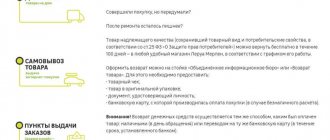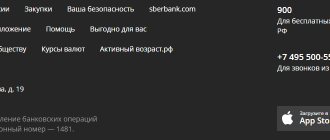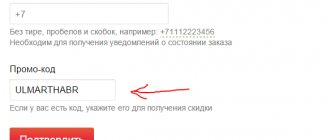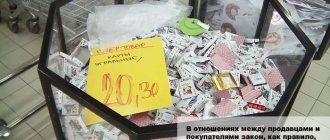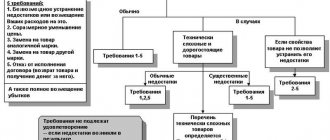What is food quality testing?
When checking the quality of food products, they are assessed according to several parameters, each of which is assessed on a ten-point scale and compared with approved standards (GOST or TU).
During the inspection, samples of finished products, single copies and trial batches may be used.
The check can take place directly at the enterprise, in a store or in a specialized laboratory of Rospotrebnadzor.
When checking products for quality, Rospotrebnadzor adheres to strict rules. The purpose of such events is to identify low-quality goods that violate consumer rights.
Who is authorized to conduct food inspections?
In accordance with the Federal Law, expert work must be carried out by Rospotrebnadzor or other state and commercial companies accredited for this type of activity. The findings of these organizations provide strong evidence in consumer disputes. Thorough scientific research, carried out in special laboratory conditions, helps to correctly establish the characteristics of the product, the suitability or unsuitability of its use. They provide the opportunity to determine the exact composition of a product, the presence or absence of harmful components prohibited for use in production.
How to order an examination and how much does it cost?
To initiate expert research, the consumer must write a statement and submit it to Rospotrebnadzor through any district consumer rights protection department. The application is accompanied by the product itself and the sales receipt for it.
The absence of a sales receipt should not be an obstacle or a reason for refusing to submit an application. In any case, Rospotrebnadzor employees are obliged to accept the complaint and issue an official conclusion after an examination.
The cost of laboratory tests depends on their direction and degree of complexity. The number of questions posed to the specialist and the duration of laboratory tests.
If the product turns out to be of inadequate quality, the examination fee is paid by the manufacturer or distributor of the illiquid product. If the complaint is denied, the consumer pays the money.
Standard laboratory testing of products purchased at the market can be carried out in the bazaar laboratory. Local veterinary and sanitary inspection includes a minimum set of standard laboratory tests and is provided to the consumer free of charge.
If poor-quality food products cause poisoning
In this case, the procedure is slightly different. The following will help prove the guilt of the manufacturer or seller:
- certificate from a medical institution;
- results of product research by an independent expert, laboratory.
When filing a claim, you must attach these documents, receipts for medications, receipts for payment for examinations and examinations.
If the administration of the retail outlet refuses to return the money and compensate for treatment costs, you can send a complaint to Rospotrebnadzor, the sanitary-epidemiological service, or file a lawsuit.
Reasons for initiating consumer expertise
- Detection of foreign objects or natural substances in the product (shards of glass, metal, waste of insects and small rodents, fragments of their bodies, mold, mildew).
- Suspicion of the expiration date of a food product, violation of the tightness of its packaging, unpleasant odor, color or taste of the product.
- Indication of false information about the composition of products, the presence of natural and synthetic components, the inclusion of which is limited or prohibited by sanitary services, current production standards.
- Poisoning from low-quality food products purchased in a grocery store, official or spontaneous market. As well as other factors causing damage to health: cuts, burns of the oral cavity, ingestion of small foreign objects found in products.
An examination of food products will establish any of the above factors or a combination of them. It will provide the consumer with a detailed conclusion, certified by the wet seal of Rospotrebnadzor and the personal signature of the expert.
Depending on the category of consumer claims, the culprit will be identified, which may be directly the manufacturer, wholesaler or retailer of food products. It is he who will bear financial responsibility for the manufacture, sale or use of illiquid products and will cover the financial expenses of the consumer. It is he who, if the expert opinion is submitted to the court, will bear criminal liability for unlawful actions in the form of improper production or trading activities.
Responsibility for the lack of electronic information
The expert opinion is not a mandatory document, therefore administrative penalties are not provided for its absence. However, this document does not exempt from certification and declaration in the GOST R and TR CU system. If a company has not passed the examinations required for their products, it will face a fine in the amount of 100 thousand to 1 million rubles, suspension of activities for a period of up to three months, and confiscation of goods.
If a company sells products of lower quality than declared, it will face a fine of 20 to 30 thousand rubles, as well as confiscation of goods. If false permitting documentation is used, the fine will be up to 1 million rubles. Lack of marking can result in a fine of up to 300 thousand rubles.
If consumers are harmed due to defective products, criminal liability may be imposed.
Grounds for inspection
The inspection by Rospotrebnadzor is regulated by Russian legislation. In this case, department employees should focus on 294-FZ, which protects the rights of legal entities from excessive control by government agencies. Here are the rules for conducting scheduled and unscheduled inspections, the timing of inspections and their documentary support, restrictions and registration of inspection results.
Product quality can be checked according to Art. 18 of the Law on Protection of Consumer Rights. The consumer may request an inspection from Rospotrebnadzor if the retail outlet that sold the low-quality product did not satisfy his claim.
What objects are checked
Rospotrebnadzor controls all enterprises and organizations that provide services, produce and sell consumer goods. In each type of institution, inspection points are different.
Schools and gardens
They occupy a special place in the list of those controlled by Rospotrebnadzor. Schools are inspected based on SanPiN 2.4.2.2821-10, preschool institutions - 2.4.1.3049-13.
In them, Rospotrebnadzor specialists will first of all check the compliance of staff positions with their professional training and qualifications. It is necessary to confirm the availability of specialized education for educators and teachers.
It is mandatory to carefully study the frequency and timeliness of medical examinations and the availability of medical records.
Next, the premises in which students study or groups in kindergarten are located are checked:
- square;
- availability of water supply, sewerage, ventilation;
- lighting;
- catering;
- sanitary conditions for children.
Particular attention is paid to organizing meals for children and training staff working in the kitchen. The surrounding area will also be examined for the availability of equipment and compliance with safety conditions for children.
Medical institutions
Rospotrebnadzor evaluates clinics and hospitals using SanPiN 2.1.3.2630-10. The following factors are considered important here:
- safety of patients’ stay and the risk of contracting hospital-acquired infections; waste disposal methods;
- working conditions of medical personnel;
- organization and quality of nutrition for patients;
- compliance of medical consumables with legal requirements;
- qualifications and training of medical personnel.
The shops
Rospotrebnadzor will definitely check:
- documents confirming the origin and quality of products sold;
- storage conditions of goods;
- Availability of special clothing and medical books for staff;
- organization of waste disposal;
- sanitary conditions at the site (sewage, water supply, availability of detergents, maintenance of the surrounding area).
Production
They check the compliance of knowledge and professional training of personnel, the availability of medical books, working and rest conditions of personnel, sanitary and living conditions, the process of accumulation and disposal of waste, production automation, quality of raw materials, control over manufactured products.
Public catering
At the catering establishment, they will check the sanitary condition of the kitchen and hall, quality certificates for raw materials, conditions of preparation and storage of products, compliance with the rules of washing dishes, availability and adherence to technological processes for preparing dishes, sanitary knowledge of the staff and medical books.
Who can order
Submission for examination can come from both an individual who has suffered from a low-quality product, and from an organization that wants to receive a quality certificate for its products.
To do this, you need to select an organization (state or non-state), apply there with the appropriate application, conclude an agreement, provide product samples for analysis, pay for their services and wait for the conclusion.
In addition to Rospotrebnadzor, for an examination you can contact a private independent center, a veterinary laboratory (you can bring eggs, milk, meat, and other products of animal origin), or a forensic medical examination bureau.
Which products require special attention?
Based on the results of many years of work, Rospotrebnadzor has created a special website, which now contains a list of products that do not meet established requirements and contain violations. This “black list” from Rospotrebnadzor began its work at the beginning of 2021.
In order to clarify whether a particular product is included in the specified list, and whether it is prohibited for sale on Russian territory, you should adhere to the following algorithm:
- Follow this link.
- On the left, find the position “Products that do not comply with...”.
- Enter product data in the search field. You can also search for specific products by region or production date.
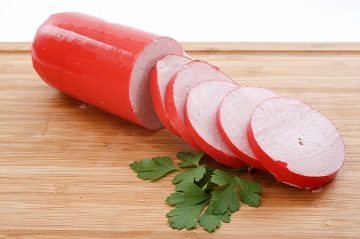
special attention to the quality of sausages , in which, during inspection, violations and changes in composition for the worse are often found.
Often high levels of phosphates, microorganisms and other additives are found there.
Rospotrebnadzor also takes a particularly responsible approach to the analysis of children's nutrition . Thus, during a recent test of children's drinking water, not a single sample passed the test, and mercury was found in three.
Also, statistics from Rospotrebnadzor indicate that the most frequently required inspection is dairy products (in particular, butter is one of the most frequently counterfeited goods, as well as margarine, sour cream and cottage cheese) and prepared foods.
In addition to the quality of food products, Rospotrebnadzor analyzes their storage conditions. The most common violations are failure to comply with sanitary requirements for premises; failure to maintain the required temperature and humidity in warehouses; lack of markings on products; lack of protocols, non-compliance with the frequency of examinations; lack of necessary information on price tags.
Consumer actions when purchasing food products of inadequate quality
Most likely, not a single person has gone through his life without purchasing spoiled products, wasting his health, money, strength and nerves. Currently, the issue of food safety and quality is becoming increasingly relevant.
According to Article 7 of the Law of the Russian Federation “On the Protection of Consumer Rights”, every buyer has the right to purchase goods that are safe for their life and health. Entrepreneurs selling expired goods that are not suitable for food violate the basic requirements of the above law, as well as other Federal Laws and sanitary-epidemiological rules and regulations. The special legislation regulating relations in the field of ensuring the quality and safety of food products is the Federal Law “On the Quality and Safety of Food Products” No. 29-FZ of January 2, 2000, the Federal Law “On Technical Regulation” No. 184-FZ of December 27, 2002 ., GOST R 51074-2003 “Food products. Information for the consumer." Products that have expired are of poor quality and even dangerous, which is why they pose a threat to human health and life, and should not be sold. And the production, storage and sale of such products will contain signs of a crime, which can be punishable by up to two years of imprisonment (provisions of Part 1 of Article 238 of the Criminal Code of the Russian Federation).
Of course, there are preventive measures that will prevent this from happening. This includes checking the date of manufacture of the product, and paying attention to repackaging that was clearly done in the store, etc.
Thus, in accordance with the requirements of GOST R 51074-2003 “Food Products. Information for consumers" information on food products must contain the following information:
1. Product name.
2. Name and location of the manufacturer (legal address) and the organization in the Russian Federation authorized by the manufacturer to accept claims from consumers on its territory (if any).
3. The manufacturer's trademark (if any), approved or accepted by the manufacturer in the manner established in the countries where the manufacturer or the company that owns this trademark is located.
4. Net weight, volume, or quantity of the product.
5. Product composition.
6. Nutritional value (calorie or energy value, content of proteins, fats, carbohydrates, vitamins, macro- and microelements).
7. Purpose and conditions of use for baby food products, dietary food products and dietary supplements.
8. Recommendations for preparing ready meals are required for concentrates and semi-finished food products.
9. Shelf life and storage conditions of food products.
10. The shelf life of the food product is set by the manufacturer, taking into account the period of its storage and intended use at home.
11. Date of manufacture and date of packaging.
12. Designation of the document in accordance with which the product is manufactured and can be identified (may be applied without indicating the year of approval).
13. Information on confirmation of conformity of food products.
According to the Federal Law “On the Quality and Safety of Food Products,” food products, materials and products that meet the requirements of regulatory documents and have passed state registration may be in circulation.
Attention! Food products, materials and products that:
- do not comply with the requirements of regulatory documents;
- have obvious signs of poor quality that do not raise doubts among representatives of bodies exercising state supervision in the field of ensuring the quality and safety of food products (hereinafter referred to as state supervision bodies) when checking such products, materials and products;
- do not correspond to the information provided, and in respect of which there is reasonable suspicion of their falsification;
- do not have established expiration dates (for food products, materials and products for which the establishment of expiration dates is mandatory) or whose expiration dates have expired;
- do not have markings containing information required by law or regulatory documents, or for which such information is not available.
If you have any doubts about the quality of food products, ask the seller for documents confirming the origin and quality of the goods.
At the buyer's request, the seller must provide one of the following documents:
-certificate or declaration of conformity;
- a copy of the certificate certified by the holder of the original certificate, a notary or the goods certification body that issued the certificate;
- product accompanying documents prepared by the manufacturer or supplier (seller) and containing for each product name information on confirmation of its compliance with the established requirements (number of the certificate of conformity, its validity period, the body that issued the certificate, or the registration number of the declaration of conformity, its validity period , name of the manufacturer or supplier (seller) who accepted the declaration, and the body that registered it). These documents are certified by the signature and seal of the manufacturer (supplier, seller) indicating the address and telephone number.
Let's consider a situation in which trouble did occur, and the products that you bought and brought home unexpectedly turned out to be spoiled.
First of all, you need to check the expiration date of the product. When returning expired products, in most cases there are no problems if you keep the receipt for payment for the goods.
The Law “On the Protection of Consumer Rights” establishes that the absence of a consumer’s cash or sales receipt or other document certifying the fact and conditions of purchase of goods is not a basis for refusal to satisfy his demands and does not deprive him of the opportunity to refer to witness testimony in confirmation of the conclusion of the contract However, in practice, the absence of a receipt is an obstacle to proving the fact of purchase of goods.
If the issue is not the expiration date, but the product really does not meet the consumer’s requirements, then in this case it will be more difficult to return the product.
Let's consider several cases:
The consumer purchased fish, and immediately after purchase, discovered that the product had an odor that was not typical for fish, so we can safely assume that the product was spoiled. What to do?
In such a situation, we recommend that you immediately, without delay, contact the seller with a written claim, drawn up in 2 copies, demanding to replace the defective product with a product of good quality, or to demand termination of the sales contract and a refund of the money paid for the product.
When returning to the buyer the amount paid for the goods, the seller does not have the right to deduct from it the amount by which the value of the goods has decreased due to full or partial use of the goods, loss of their presentation, etc.
I would like to draw your attention to the fact that it makes no sense to take the purchased product, even if it is not of high quality, for examination, since even if the examination establishes that the product is indeed damaged, it will be difficult to prove at what stage the damage to the goods occurred, whether the conditions of transportation and storage of goods established by the manufacturer.
In order to verify that there are products of inadequate quality in circulation, the consumer must seek help from the authorized state control (supervision) bodies, which include Rospotrebnadzor. This service, at the request of the consumer, will conduct an inspection of the trade enterprise as part of control measures.
In the application, the consumer must indicate: the name of the legal entity or the surname, name and patronymic of the individual entrepreneur who, by their actions (inaction) violated the rights of the consumer, the exact location of the store where the low-quality product was purchased, as well as the name of the product, manufacturer, grade, batch, weight net or volume in consumer packaging, date of manufacture and packaging and other distinctive features of the product, so that food products can be selected for examination in accordance with the requirements of regulatory documents.
There are cases when, as a result of consuming a particular product, the consumer is harmed to health (a broken tooth, food poisoning). Thus, the consumer must contact medical institutions to document the fact of harm to health resulting from the use of this product. In addition, you need to keep receipts for purchased medications.
If you just discovered a damaged product in a store, then the actions should be as follows:
• call the administrator and demand that the damaged goods be removed from the counter and removed from sale;
• if the administrator refuses, then leave an entry in the book of complaints, comments and suggestions, which is located in the consumer's corner. Do not forget to indicate your contact information, as well as information about when and with what period of sale the product was identified;
When purchasing food in stores, you need:
• Know about the existence of the Law “On Protection of Consumer Rights”;
• Read labels carefully;
• Save receipts;
• Do not be afraid to contact government agencies whose responsibilities include monitoring the sanitary quality of trade;
• Don't be afraid to defend your rights.
We advise consumers not to lose their vigilance, to be more attentive when purchasing food products, and to demand the provision of the necessary information. Remember, the more information about goods a buyer has, the more successful his choice when purchasing and the greater the chance of purchasing a safe product of good quality.
How Rospotrebnadzor checks the quality of food products
Inspections carried out by Rospotrebnadzor are of several types:
- Planned , which are carried out every three years on the basis of a specially developed schedule for the year.
- Unscheduled , which are carried out based on requests from citizens.
Thus, citizens themselves can become the direct initiators of an unscheduled inspection of food products from Rospotrebnadzor.
If a citizen identifies any violations in the composition, he can file a complaint with the institution. It is especially important to promptly complain to Rospotrebnadzor if the product is hazardous to human health.
A citizen can file a complaint about low-quality food products in one of the following ways:
- through the official Internet resource ;
- by means of a written request , which is transmitted directly to the department;
- by registered mail with a list of the contents.
A complaint about a defective product must contain the following information:
- Name of the retail outlet where the product was purchased.
- Applicant details and contacts.
- Product description : its name and brand, production date, expiration date, cost and place of purchase.
- Reason for appeal : for example, the quality of goods does not meet the required level; parameters stated on the packaging - actual composition; the product is on the “black list” or is sanctioned, etc.
- Applications can include photo data , receipts and other documents.
- Date and signature.
After contacting Rospotrebnadzor with a complaint, the agency must schedule an inspection within 30 days. In this case, the applicant will be notified of the results of verification activities.
How many days are there to return a purchase?
Spoiled sausages, meat, and fish can be disposed of immediately or during the expiration date. It should be borne in mind that the chances of withdrawing money or exchanging for other products are higher if you apply on the day of purchase.
If the product turns out to be of poor quality, the store will not be able to refuse it even after a week. But it will be more difficult to prove violation of storage conditions by the seller, depressurization of the packaging before transfer to the buyer or the manufacturer’s fault.
If you cannot hand over sour milk or spoiled sausage on the same day (there is no time, the store is already closed), you can return the next day or another day. Consider expiration dates and observe storage conditions before returning to the seller.
For example, chilled fresh minced meat, semi-finished meat products, and offal can be stored for 12 to 48 hours in airtight packaging. Smoked sausages, poultry carcasses if the packaging is broken - up to 72 hours. A longer shelf life - up to 7 days - for sausages and frankfurters in vapor-gas-tight casings.
Chilled fish should be shipped within 48 hours. You can try to exchange milk, cottage cheese, sour cream and other dairy products, depending on the type of packaging and heat treatment, in the next 24–48 hours. The terms and conditions of storage of specific types of food products are approved by sanitary standards and rules SanPiN 2.3.2.1324-03.
Where can food products be tested?
An expert opinion on any type of food product and the most extensive and in-depth laboratory research can be ordered from Rospotrebnadzor, whose offices are located in all cities of the Russian Federation. In addition, the Moscow independent testing agency offers to order an examination of dairy, meat, fish and bakery products, drinking water and semi-finished products.
Specialized consumer examinations for food products, drinking water and alcohol are carried out by an independent organization and several dozen other similar organizations, the addresses and coordinates of which can be found on the Internet.
Therefore, do not waste your time and energy on empty arguments with manufacturers and sellers of low-quality products. And immediately submit a request to a specialized authority, conduct official research, prove the unlawful actions of your opponents, and receive legal compensation for moral and material damage caused to you after purchasing illiquid food products.
Types of examinations
The use of a specific type depends on the purpose pursued by the customer.
Veterinary and sanitary
Allows you to determine the good quality of livestock products:
Dear readers! To solve your problem right now, get a free consultation
— contact the lawyer on duty in the online chat on the right or call: +7 (499) 938 6124 — Moscow and region.
+7 (812) 425 6761 — St. Petersburg and region. +8 (800) 350 8362 - Other regions of the Russian Federation You will not need to waste your time and nerves
- an experienced lawyer will solve all your problems!
- eggs;
- fish;
- milk and fermented milk derivatives;
- meat;
- cheese.
Animals also need such a check; they are examined for diseases and infections.
It is carried out using microbiological, histological, physical, chemical and other methods. Veterinary doctors and paramedics at meat industry enterprises and control stations of food markets have the right to carry out veterinary and sanitary examinations.
Sanitary and hygienic
The task of sanitary and hygienic examination includes:
- determination of organoleptic properties;
- identifying changes in the chemical composition of the sample and their causes;
- bacterial contamination;
- establishing the amount of pesticides and food additives;
- clarification of the conditions of production, storage and sale;
- investigation of possible transmission of infections.
It will become clear whether food can be used for food, what conditions of sale must be met (for example, heat treatment, industrial processing). If the sample is found unsuitable for food, the expert will indicate the method of destruction: as animal feed or disposal.
Physico-chemical
Reagents and special equipment are used. The purpose of the check is to identify certain parameters:
- moisture level;
- energy value;
- harmful impurities;
- pathogenic bacteria;
- nutrient ratio.
Microbiological
Microbiological analysis can reveal the presence of pathogenic microorganisms, toxins and foreign contaminants. It is carried out by persons with special professional training using laboratory equipment. The analysis reveals the fact and reasons for the development of biological processes in any food product.
Commodity
Commodity examination is the main type of examination of goods and food products. It includes an assessment of all product characteristics: quantitative, qualitative, assortment, cost. Organoleptic, physico-chemical, microbiological, technical parameters are tested and weighed.
Planned
Carried out by state supervisory authorities of Rospotrebnadzor or Roskontrol with the frequency prescribed by current legislation.
The goal is to determine the suitability of food supplies, as well as the following parameters:
- quality;
- absence of harmful impurities and microorganisms;
- amount of food additives and preservatives, heavy metals;
- compliance of containers with sanitary requirements;
- nutritional value;
- content of nutrients, microelements, vitamins, degree of fortification.
Unscheduled
Unscheduled is carried out in special cases:
- Suspicion of food poisoning or infection, complaints from citizens about poor quality, an incident of infection during an accident in housing and communal services, transportation that does not meet sanitary standards.
- Judicially.
- on behalf of higher government bodies.
Where is the inspection carried out?
Rospotrebnadzor checks goods presented in Russian retail outlets, public catering establishments or directly at enterprises.
The products themselves are analyzed in special laboratories created on the basis of Rospotrebnadzor. From the perspective of where the inspection will take place, inspectors will personally come to the enterprise or store (this is called an on-site inspection) or remotely request samples from them.
During the inspection, Rospotrebnadzor employees have the right to demand the necessary documents from the retail outlet, take samples from products, visit any premises, etc. Based on the results, a report is drawn up.
Where can I do it?
The consumer has several options for where to submit a sample for analysis.
| Types of organizations | Where to find |
| State organizations | Rospotrbenadzor. In each large settlement or regional center, a representative office of this body accepts product samples; the address can be found on the official website of the organization or by calling the hotline 8-800-100-0004 |
| The Bureau of Forensic Medicine will make an analysis based on citizens' appeals and for the court | |
| Non-governmental organizations | Veterinarians accept products of animal origin for analysis. |
| Private expert medical centers. On a paid basis, food products are examined according to parameters specified by the customer; before paying for services, you must make sure that the expert has the appropriate qualifications, for example, medical education. So, in Moscow you can order it at the address: Taras Shevchenko embankment, 3, building 2, . In St. Petersburg - on the street. Chugunnoy, 14, lit. 3, "Ecologist Expert". In Novosibirsk, such services are provided by the Food Products Testing Laboratory (Revolution St., 36, office 1). In Krasnodar, Scientific Center of Independent Experts LLC is located at the address: st. Zipovskaya, 45. |
Order of conduct
The objectives of food inspection from Rospotrebnadzor are:
- Studying the composition of food products and analyzing how well it matches the label.
- Identification of pathological microorganisms that can negatively affect the human body.
- Determining whether the product contains prohibited elements that can negatively affect the human body (for example, harmful additives, palm oil, etc.).
- Do the products meet current GOST standards?.
The product that was received at production, during a test purchase or a complaint from the applicant about violations, is tested, its quality is assessed and a composition study is carried out.
Rospotrebnadzor conducts research using various organoleptic (in other words, by tasting and assessing appearance) and biochemical studies. The institution uses such analysis methods as:
- Physico-chemical method . It allows you to determine the fat content, moisture, acidity of the product, the proportion of carbohydrates, proteins and fats. During research, employees may identify discrepancies between the indicators indicated on the packaging: for example, the manufacturer prescribed the wrong fat content or the composition contains a lower percentage of protein.
- Chemical analysis . It allows you to identify toxic compounds in food products: salts of heavy metals, bacteria, various impurities that have entered the product from the outside during transportation or storage.
- Microbiological quality control . It allows you to detect contamination of products with pathogenic microorganisms: E. coli; fungi, bacteria and viruses; yeast mushrooms.
If a low-quality product is discovered, the entire lot may be removed from sale. This product will not be distributed on Russian territory until the manufacturer corrects the defects.
The results of the study and inspection are necessarily posted on the Rospotrebnadzor website.
Thus, Rospotrebnadzor is responsible for monitoring the quality of food products distributed through retail outlets. During such an inspection, the authority conducts an examination to check the product’s compliance with state requirements and GOSTs. If violations are detected, then such products are included in the “black list” and can be viewed on the official website of Rospotrebnadzor.
Why do you need to contact the laboratory?
Analysis of the provided sample will allow us to determine the quality and safety of the object and the cause-and-effect relationship with harm to health, if any. The expert must solve several problems.
Determine the presence of bacteria or toxins
To do this, a microbiological analysis will be carried out, which will reveal the presence of bacteria and toxins. The expert will compare their level with GOST and make an informed decision.
Find out the expiration date of the product
The expiration date is indicated on the packaging, but it happens that unscrupulous stores regularly re-label the label with the production date or indicate only the packaging date. Such food can seriously harm your stomach and health. The examination will determine how long ago the product was manufactured and whether it can be consumed now.
Determine the composition of the product
The composition can be found by carefully studying the packaging. Some manufacturers deliberately do not list additives or impurities in order to inspire consumer confidence. If a person encounters a product whose composition clearly does not correspond to what is indicated on the packaging, he has the right to seek an independent examination in order to punish such a manufacturer.
Find out the suitability of the product
The expert will determine whether the product is suitable for food by performing the necessary laboratory tests on the provided sample. The composition and content of nitrates and carcinogens can be so dangerous that the conclusion will prohibit its use even as animal food.
Examine the sample for vegetable fat content
This is especially true for dairy products, which should not contain them. The consumer may doubt the quality of butter based on taste and external data. This indicates that the manufacturer used low-quality raw materials.
Determine the content of substitutes for natural ingredients
For example, chocolate manufacturers often replace cocoa butter with low-value substitutes. This can be regarded as deception of the buyer, and the proof will be the result of the examination.
The best products according to Roskachestvo
Doctor's sausage
To find the ideal sandwich component, Roskachestvo experts examined 40 brands. The composition and production process, as well as the appearance, consistency, taste and aroma of the sausage were checked.
At the same time, we dealt with the myths that worry fans of “Doctorskaya”:
- there is no meat in the sausage, just paper;
- sausage is made from domestic animals and pigeons;
- and then add flavor enhancers.
As a result of the test, neither cellulose nor DNA from cats or dogs was found in any sausage sample. However, soy and corn were found in two samples, and traces of antibiotics were found in 17. Two more brands - “Egoryevskaya” and “Tsaritsyno” - added chicken to the sausage, although “Doctorskaya” is made from beef and pork.
All sausages were also free of E. coli and excess sodium nitrite and phosphate. This means that any of the samples will not cause poisoning or disruption of phosphorus-calcium metabolism.
Glazed cheese curds
There are cheesecakes for 50, 30 and 5 rubles, and these are not the tricks of marketers, but simply different products.
Thus, “curd cheeses” are a product without vegetable fats and preservatives, “glazed cheese curds” are without vegetable fats, but with preservatives, “milk or curd products” are with vegetable fats, but not more than 50%, and “desserts” are with vegetable fats more than 50%. So read the packaging - the name of the product should be indicated there.
Roskachestvo specialists checked 29 cheese curds of different categories according to 53 indicators and chose the three best: “Korovka from Korenovka”, “Miracle” and “Nostalgia”.
E. coli was found in four cheesecakes with vegetable fat, yeast in five, and mold in another two. A combo of three violations was made by Clever cheesecakes.
Crab sticks
The semi-finished product for salads is made from minced fish. The fish used are mainly pollock, blue whiting and hake. Roskachestvo specialists checked 30 manufacturers and in half of the cases found more than 15% starch in the composition - they replace minced meat.
But there is good news: traces of crab meat were found in five stamps. And if in two of them this is more of an advertising gimmick, then in Columbus and Vici the proportion of crab is more than 160 mg/kg. No pesticides, hazardous metals or microorganisms, toxic compounds or radionuclides were found in any crab sticks.
Dumplings
Roskachestvo specialists tried 48 brands of dumplings. They checked whether meat was replaced with soy, whether the dough breaks during cooking, and 88 other indicators. Not a single dumpling scored the maximum number of points - even the leaders of the rating have problems.
E. coli was found in nine samples, and since the product is frozen and packaged at the factory, the problem is most likely at this stage. Microorganisms were found in eight dumplings, and mold in some.
Spaghetti
Roskachestvo came to the attention of 21 brands of durum wheat spaghetti: 7 Italian, one German and 13 Russian. Spaghetti is distinguished from the usual pasta by strict requirements for appearance and flour.
Good spaghetti has a smooth and transparent break, a uniform color, an even cylindrical shape, almost unchanged during cooking. No one had any problems with this, except for “The Seventh Continent” - they found white inclusions. This means that the dough was poorly kneaded or that low-grade flour was used.
Sources
- https://zakonguru.com/zpp/tovary/proverka-produktov.html
- https://DezEcoClean.ru/informaciya/kak-otdat-produkty-na-jekspertizu-v-rospotrebnadzor/
- https://PoPravu.club/uchrezhdeniya/rpn/proverka-produktov-pitaniya.html
- https://journal.tinkoff.ru/list/food-battle/
Testing
In addition to these activities, Rospotrebnadzor conducts product testing. It consists of 6 stages:
- Purchase.
- Depersonalization.
- Laboratory testing.
- Report.
- Compiling the rating.
- Publication.
Goods are purchased by consumer supervision workers as ordinary retail buyers. Then photographs are taken and a database is compiled. Before being sent to the laboratory, products are deidentified by removing packaging, sealing labels, and assigning them a unique code. The results obtained are analyzed and posted in the form of a report on the Roskontrol portal. RF.
For each product, compliance with safety requirements and nutritional value is established.
The rating allows you to evaluate the properties of products with a sufficient degree of clarity and compare them with each other. When a product does not meet safety requirements or is counterfeit, it is not rated, but blacklisted. Publication of the results of the examination and the blacklist involves a presentation of the details of the tests and comments from both Roskontrol employees and invited experts. Reports are posted on the website and in the mobile application.
Rospotrebnadzor employees carry out a lot of important work, in which they also involve public consumer organizations. The accessibility and transparency of reports published on the website and in the mobile application is an undoubted convenience for customers.
Since December 2013, NP Roskontrol has hardly become one of the main newsmakers in the consumer market. From experts of a non-profit partnership in 2015, Russians learned that most of the cheeses in the country are “imitation palm oil”, in 2016 - that most of the semi-smoked sausages are counterfeit, and in 2018 we were told that chicken thighs , produced under popular brands, are dangerous and contain antibiotics. Manufacturers blacklisted regularly sue Roskontrol (with varying degrees of success), but for the managers and owners of the partnership, arbitration proceedings are nothing new—billions of rubles have been “dissolved” in their previous projects.
The most interesting things are on our channel in Yandex.Zen
Entering the arena
The first serious appearance of Roskontrol in public (according to SPARK-Interfax, the partnership and the associated RK-Media Agency JSC were registered in 2012) was dated December 25, 2013. On Catholic Christmas, the Komsomolskaya Pravda newspaper published the material “People Love Sandwiches with Caviar.” In it, journalists talked about a study by Roskontrol: specialists tested six brands of red caviar and found an excess of microbes in four samples, and found signs of spoilage in two. Only the Northern Company caviar did not raise any complaints. Komsomolskaya Pravda recounted Roskontrol's research to readers in detail, releasing material on the popular caviar topic on New Year's Eve, and a little-known non-profit partnership received its first promotion.
Roskontrol posted data on caviar research on its website only a month later - on February 2, 2014. In the first half of 2014, the partnership continued to actively cooperate with Komsomolskaya Pravda: the newspaper published materials on research into sausages, salted red fish and drinking water.
During this period, the Roskontrol brand began to become more and more recognizable in the journalistic community, but the “star” material for the partnership was the publication of the results of an examination of dairy products in September 2015: “36 out of 46 brands of cheese and butter are counterfeit.” Roskontrol specialists confirmed the rumors that were circulating at that time that import substitution of cheeses in our country was happening with the help of palm oil.
After that, literally everyone learned about Roskontrol. Each new partnership study became a serious news story.
Business partnership
The managers and owners of Roskontrol can be divided into three conditional groups: “experts”, “builders” and “bankers”.
To understand how they interact with each other, you need to understand how Roskontrol works.
The role of the poster, which is put to the fore when communicating with journalists and ordinary consumers, is played by the same non-profit partnership “Regional organization of the control system” (abbreviated as NP “Roskontrol”). This is precisely what the phrase about sources of funding, posted on the organization’s website, refers to: “Roskontrol” carries out its activities through contributions and donations from organizations and citizens, among whom there are no interested parties - neither manufacturers nor retailers.”
The poster's financial performance is modest. Revenue for 2015 is 2.7 million rubles. Administrative expenses - 7.4 million. As a result, the loss is 4.7 million. After this, the organization did not publish reports.
There are two founders of NP Roskontrol - JSC Agency RK-Media, owned by a group of “bankers”, and JSC Rostest, a group of “experts”.
The rights to the Roskontrol trademark (a red and white bear with its front paws raised up) are owned by RK-Media Agency JSC. The non-profit partnership domain is also registered to it. This company is the defendant in lawsuits brought by manufacturers who are dissatisfied with the results of the examinations.
Until 2021, JSC Agency RK-Media was called CJSC Roskontrol, but the tax authorities went to court with a demand to change the name and remove the “Ros” part from it - allegedly it creates a misleading impression that the company acts on behalf of the state. The court sided with the Federal Tax Service, and the company had to be renamed.
RK-Media Agency JSC also does not show a large cash turnover. In 2015, the company earned 2.8 million rubles and spent 1.5 million.
"Bankers"
According to SPARK-Interfax, Agency RK-Media JSC is owned by 56-year-old native of the Primorsky Territory Anatoly Kolesnikov - directly and through Strong Group LLC.
Anatoly Kolesnikov is a man who has been in the shadows for almost his entire career. Before Roskontrol, he appeared in only two interesting companies, and then only briefly: at the beginning of the 2000s he headed OJSC International Center, which built the President Plaza complex in Moscow City, and in 2003 he joined the audit commission of Euromet Bank "
The owner of this collapsed bank is Dmitry Skopinov. More precisely, 100% of Euromet belongs to LLC Business Center Kronos-21 Century, and in this company Dmitry Skopinov has 99.92% of the capital, and Anatoly Kolesnikov has the rights to the remaining 0.08%.
In October 2015, the Arbitration Court declared Euromet Bank bankrupt. At the time of the revocation of the license (this happened two months earlier), the bank’s assets, according to the Central Bank of the Russian Federation, did not exceed 1.3 billion rubles, while the debt was equal to 6.7 billion rubles.
As a result of an audit organized by the Deposit Insurance Agency, it turned out that “for two years before the license was revoked, the persons controlling Euromet took actions to replace the bank’s liquid assets with bad loan debt of technical legal entities.” That is, on the eve of bankruptcy, the owners of the bank actually siphoned money out of it. In the spring of 2018, the DIA filed a lawsuit against eight citizens who could be involved in the withdrawal of funds - Dmitry Skopinov is among them, Anatoly Kolesnikov is not.
In 2021, the court found the chairman of the board of Euromet, Igor Shutov, guilty under Article 172.1 of the Criminal Code of the Russian Federation “Falsification of financial documents of accounting and reporting of a financial organization.” For concealing withdrawal operations from the Central Bank, Shutov was fined 500 thousand rubles.
"Builders"
The group of “builders” is not directly related to the ownership of Roskontrol. They control it.
This group includes members of the Gitlin family. First of all, this is Vadim Gitlin, director of NP Roskontrol and JSC Agency RK-Media. He is the only public face of the “builders” and periodically appears in the media as a speaker for Roskontrol.
Person number two is Vadim's father, Boris Moiseevich Gitlin. He owns Goldenberg LLC, once the family's main asset. The third number - Igor Borisovich Gitlin - manages the shares of CJSC Goldenberg.
The story of the construction blitzkrieg of the Gitlin family is partly reminiscent of what happened with the Euromet bank.
In 2011, Goldenberg LLC (in almost all recent years the company reported losses and did not show much turnover) unexpectedly won a competition for the reconstruction of a bridge in the Nagatinskaya floodplain, which was held by the Moscow Housing and Communal Services Department. In the fight for a contract worth more than two billion rubles, Boris Gitlin’s company left behind six competitors.
In 2014, Goldenberg LLC received another capital contract - this time from the Department of Construction. Boris Gitlin’s company was supposed to build the “House of Moscow” in Vilnius for 677 million rubles. The bank guarantee for this contract was issued by Dmitry Skopinov's Euromet.
The construction contract in Vilnius was concluded against the background of gigantic claims against Goldenberg LLC under the previous order - practically no work was carried out to put the Nagatinsky Bridge in order. In October 2014, the mayor's office, through the court, was able to terminate the contract and invite a new contractor.
The “House of Moscow” also remained only on paper, however, due to the fault of the Lithuanian authorities, who, against the backdrop of cooling relations, did not allow construction to begin.
Also, according to media reports, Goldenberg LLC was one of the contractors of Atomstroyexport in the project for the construction of the Rooppur nuclear power plant in Bangladesh. There is no information about this transaction in the SPARK-Interfax system, but indirect evidence of this information is that the only branch of Goldenberg LLC operated in the capital of Bangladesh, Dhaka. The documents of the Arbitration Court of the Nizhny Novgorod Region mention agreement No. 7764/141499 dated February 6, 2015 between Goldenberg LLC and Atomstroyexport, under which 546 million rubles were transferred.
In April 2021, Goldenberg LLC was declared bankrupt.
The amount of claims currently declared exceeds one billion rubles. Among those who expressed demands were the tax office, the Moscow government, subcontractors, and Boris Gitlin’s Business Class LLC. But the largest creditors are two offshore companies: Golden Barley Capital Limited and Orsford Limited.
"Experts"
The group of “experts”, which logically should be the main one in Roskontrol, is not involved in the management of the partnership in any way.
They are presented exclusively within JSC Rostest. This is a private company that operates “under the wing” of the state Federal Budgetary Institution “Rostest-Moscow”, which is engaged in certification and laboratory testing.
The turnover of JSC Rostest is about 300-400 million rubles every year. In 2016, the company’s revenue amounted to 393 million rubles, but expenses turned out to be higher, and at the end of 12 months, Rostest JSC recorded a loss of 151 million. However, in all previous years the company remained in the black.
100% of the shares of Rostest JSC are owned by NPF Testekspertiza LLC. It, in turn, is owned 98% by Olga Pavkina, and 2% by Gennady Barsegov. The latter is the chairman of the board of Sinto-Bank.
- State bodies of standardization and metrology
that issue requirements for the composition, quality and properties of this or that. For 2020, the GOST document is not mandatory. The product manufacturer has the right to establish its own technical conditions (TS), but if the manufactured product has a standard number, then the quality must meet the requirements. - Voluntary certification centers.
Based on the results of the laboratory experiment, products are subject to declaration. If the properties of the product coincide with the declared indicators, the certification center will issue the corresponding document. Only high-quality products are sent to the laboratory, and these centers very rarely fail.In case of refusal, the manufacturer has the right to contact another body - this leads to the conclusion that the declaration of this center is not a guarantee of the quality of the food product.
- Manufacturer.
Of course, the manufacturer is obliged to exercise control over the goods he produces. At the factory, testing is carried out in three stages:- Analysis and evaluation of raw materials.
Monitoring production, where the recipe, manufacturing technology, temperature, etc. are fully observed.
- Analysis of compliance of the product batch with technical specifications or GOSTs.
- .
When a manufacturer registers a new product, this body fully checks all the necessary documentation confirming the composition and safety of the product. Also carries out laboratory tests if available. If there are violations of sanitary standards, Rospotrebnadzor imposes a ban on the sale of this food product. - Roskontrol.
An independent organization evaluates the quality of goods in Russian stores. The purpose of this body is to provide reliable information about the product to the consumer. The company publishes the results of its research on its official website.
Often there may be unscrupulous manufacturers who try to circumvent the law. It should be remembered that product quality directly depends on the manufacturer - if he is not interested in it, then control will be nominal.

